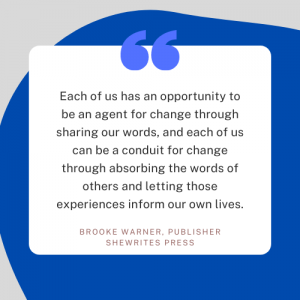Thursday, August 6, 2020
by Brooke Warner 
(Brooke Warner will be speaking with Michelle Tea on the topic of using your memoir as a force for change at San Francisco Writing For Change: Worldwide on September 8. Register and join us for this Inspiration Conversation!)
I was twelve or thirteen when I read Go Ask Alice. It was fiction, or so it claimed to be, but the anonymity of the author and the wrenching story it told of a self-destructive fifteen-year-old girl made me feel like Alice could have been a girl I knew. If Go Ask Alice were published today, no doubt it would be a memoir, no need for a story like that to be masked in the shadows of anonymity. Today’s memoirs hold nothing back, and the impact for readers is a shared intimacy. Memoirists, to their readers, are the friends who share everything, making our own stresses and challenges seem somehow less daunting.
The intimacy of modern memoir is something to behold. Writers who long to be seen, to express what might feel taboo, or to finally release long-held secrets do so on the page—oftentimes sharing with countless readers what they’ve barely breathed a word of to their closest family and friends. Readers are invited into the most traumatic moments of a person’s life, their most messed-up family dynamics, their deepest longings. If the writer’s done their job, the reader feels seen too. There’s a reciprocity that happens when an experience lands with deep resonance—of writer releasing and reader receiving. Inhale, exhale. I’ve marveled many times reading memoirs in which the author captured something I’d felt but never had the wherewithal to put into words before. Even better is when I read something I’ve never even thought, but know, immediately upon reading, to be true.
Memoir effects change in this way because it invites readers into a whole other world, the lived experience of another whose life is likely shaped by different influences, circumstances, and realities. When readers accept the invitation, understanding and compassion grow, and hearts open.
Personal truths typed up and packaged into bound pages called memoirs capture zeitgeists (like when Anne Lamott’s Operating Instructions opened doors for a generation of ambivalent mothers to breathe a sigh of relief that they were not alone); make us think differently about life in another person’s skin (like when Roxane Gay spoke about her “wildly undisciplined” body in Hunger); challenge assumptions (like how Hillbilly Elegy prompted many to think differently about Appalachia and its people); and open up possibilities (like how Maya Angelou’s I Know Why the Caged Bird Sings offered hope and courage and a model of resilience for others whose lives were informed by trauma and racism and sexism).
Whether you’re writing or reading, memoir can set you free. It’s a method for change for writers and readers alike. Writing memoir will change your life in supporting you to better understand what you’ve lived through. If you allow it to, the process will increase your compassion, even toward those who hurt you. Reading memoir is a looking glass into others’ lives. It might make you more feel more grateful. Perhaps it shines light on disparities, injustices, and the many “-isms” that stand in people’s way. Maybe it saves you because in the memoirist, you see yourself—and they offer you a way through to the other side.
Memoir is an exploding genre, but one challenged by the publishing industry’s reservations about what can and will sell. Readers crave true stories of transformation, resilience, and survival in all its forms—and we all have a story to tell. Each of us has an opportunity to be an agent for change through sharing our words, and each of us can be a conduit for change through absorbing the words of others and letting those experiences inform our own lives. This exchange between storyteller and story-receiver is as old as time, and never has there been a more powerful moment to effect change through being both giver and receiver of stories. Write, read. Exhale, inhale.
___________________________________________________________________________
Brooke Warner is publisher of She Writes Press and SparkPress, president of Warner Coaching Inc., and author of Write On, Sisters!, Green-light Your Book, What’s Your Book?, and three books on memoir. Brooke is a TEDx speaker, weekly podcaster (of “Write-minded” with co-host Grant Faulkner of NaNoWriMo), and the former Executive Editor of Seal Press. She writes a monthly column for Publishers Weekly.
www.brookewarner.com
facebook.com/warnercoaching/
twitter.com/brooke_warner
The San Francisco Writers Conference and the San Francisco Writing for Change conference are both produced by the San Francisco Writers Conference & San Francisco Writers Foundation, a 501(c)3 nonprofit. The SFWC Director is Laurie McLean. For registration help, contact Richard Santos at registrations@sfwriters.org. For SFWC sponsorship opportunities, contact Carla King at Carla@carlaking.com.
The SFWC website is: www.SFWriters.org